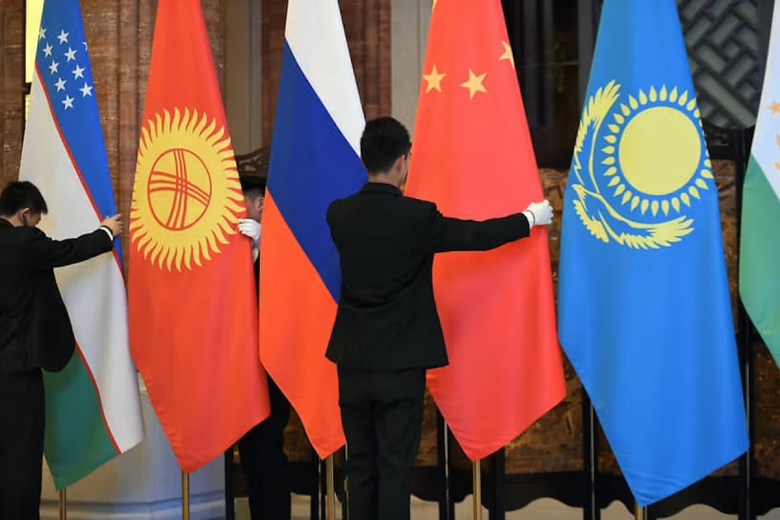Top Stories
China Showcases Ambitions at SCO Summit in Tianjin

The recent Shanghai Cooperation Organization (SCO) summit in Tianjin served as a revealing glimpse into China’s evolving foreign policy. Held in 2025, this gathering underscored Beijing’s shift from compliance with Western-led institutions to assertively attempting to unify a coalition of nations often seen as marginalized. This transformation reflects a broader strategy where abstention from participation in such forums becomes increasingly costly for member states.
Central Asian countries view membership as a form of insurance against great power rivalries, while India remains engaged to prevent China from monopolizing regional dynamics. Belarus joined the SCO in 2024 to avoid international isolation, and Iran seeks to leverage its membership to counteract diplomatic marginalization amid ongoing sanctions. For these nations and others, exclusion from the SCO equates to a loss of influence in critical discussions.
Chinese President Xi Jinping emphasized the importance of trade among SCO members, noting it has exceeded US$500 billion. He framed bilateral agreements as signs of multilateral progress, highlighting the adaptability of initiatives like the Belt and Road Initiative (BRI) within SCO discussions. The summit also advanced China’s Global Governance Initiative, which critiques “bloc politics” and the “Cold War mentality,” while subtly affirming loyalty to established institutions like the UN and WTO, signaling an opposition to US dominance without direct confrontation.
China’s Role as a Global Convenor
Historically, Beijing has been cautious in positioning itself as a central leader among Global South nations, adhering to the philosophy articulated by former leader Deng Xiaoping: “Hide your strength and bide your time.” However, shifting dynamics have prompted China to assert itself more prominently on the international stage, seeking to unify diverse allies, even amid their rivalries. Notably, both India and Pakistan are members of the SCO, exemplifying this complex relationship.
The summit’s optics showcased China’s emerging role as a convenor of Eurasian politics. When Indian Prime Minister Narendra Modi sat alongside Pakistani officials despite ongoing tensions, it illustrated a significant diplomatic performance. Similar dynamics were seen with Iran and Turkey, which manage their own geopolitical balancing acts while engaging with the SCO. This reliance on performative diplomacy highlights China’s potential to exert influence beyond traditional agreements, fostering relationships through dialogue rather than binding commitments.
The SCO’s operational principles diverge sharply from Western diplomatic norms. The organization operates with minimal enforcement mechanisms and allows for substantial contradictions among its members. This flexibility enables China to project authority without the pressure of adhering to strict policy frameworks. By avoiding contentious debates, the SCO can maintain a façade of unity, promoting shared skepticism towards US leadership.
Challenges Ahead for the SCO
Despite its apparent successes, the SCO faces significant hurdles. The organization’s initial focus on security has evolved into a broader mandate, incorporating development and governance initiatives. This expansion raises questions about the feasibility of aligning the diverse interests of its members. For instance, can the SCO facilitate cooperation between India and Pakistan on jointly funded projects?
Additionally, longstanding mistrust among member states complicates engagement. While China, India, and Russia appear to be strengthening ties, deep-seated suspicions remain, particularly between New Delhi and Beijing. The SCO’s perception as a Sino-Russian bloc could deter countries wary of alienating the West.
For the SCO to fulfill its potential, it must cultivate an image of independence and openness, reassuring members that participation does not equate to estrangement from Western powers. The organization’s future significance may lie not in formal agreements, but in its ability to create a platform where rival nations can coexist, and tensions are managed through diplomatic engagements.
The SCO summit may not have redefined multilateralism in Eurasia, but it certainly showcased China’s aspirations to reshape the global order. As the organization navigates its internal complexities and external perceptions, its trajectory will be closely watched by both allies and adversaries alike. The jury remains out on whether this evolving coalition can effectively balance its diverse interests while asserting its influence on the world stage.
-

 World5 months ago
World5 months agoSouth Korea’s Foreign Minister Cho Hyun to Visit China This Week
-

 Business5 months ago
Business5 months agoStarling Bank Plans Secondary Share Sale, Targeting $5.4 Billion Valuation
-

 Top Stories5 months ago
Top Stories5 months agoMunsang College Celebrates 100 Years with Grand Ceremony
-

 World5 months ago
World5 months agoPAS Aims to Expand Parliamentary Influence in Upcoming Election
-

 Business7 months ago
Business7 months agoKenvue Dismisses CEO Thibaut Mongon as Strategic Review Advances
-

 Lifestyle6 months ago
Lifestyle6 months agoHumanism Camp Engages 250 Youths in Summer Fest 2025
-

 Sports6 months ago
Sports6 months agoDe Minaur Triumphs at Washington Open After Thrilling Comeback
-

 Sports7 months ago
Sports7 months agoTupou and Daugunu Join First Nations Squad for Lions Clash
-

 Top Stories7 months ago
Top Stories7 months agoColombian Senator Miguel Uribe Shows Signs of Recovery After Attack
-

 World7 months ago
World7 months agoASEAN Gears Up for Historic Joint Meeting of Foreign and Economic Ministers
-

 Health6 months ago
Health6 months agoNew Study Challenges Assumptions About Aging and Inflammation
-

 Business7 months ago
Business7 months agoOil Prices Surge Following New EU Sanctions on Russia









